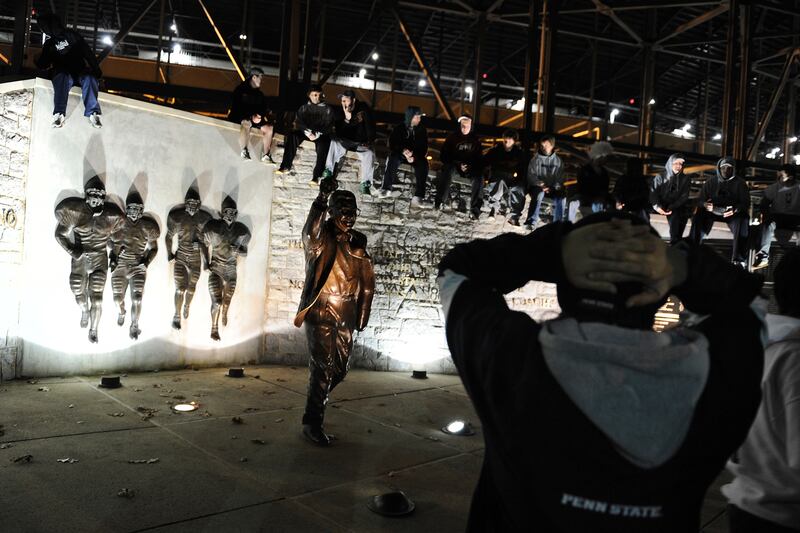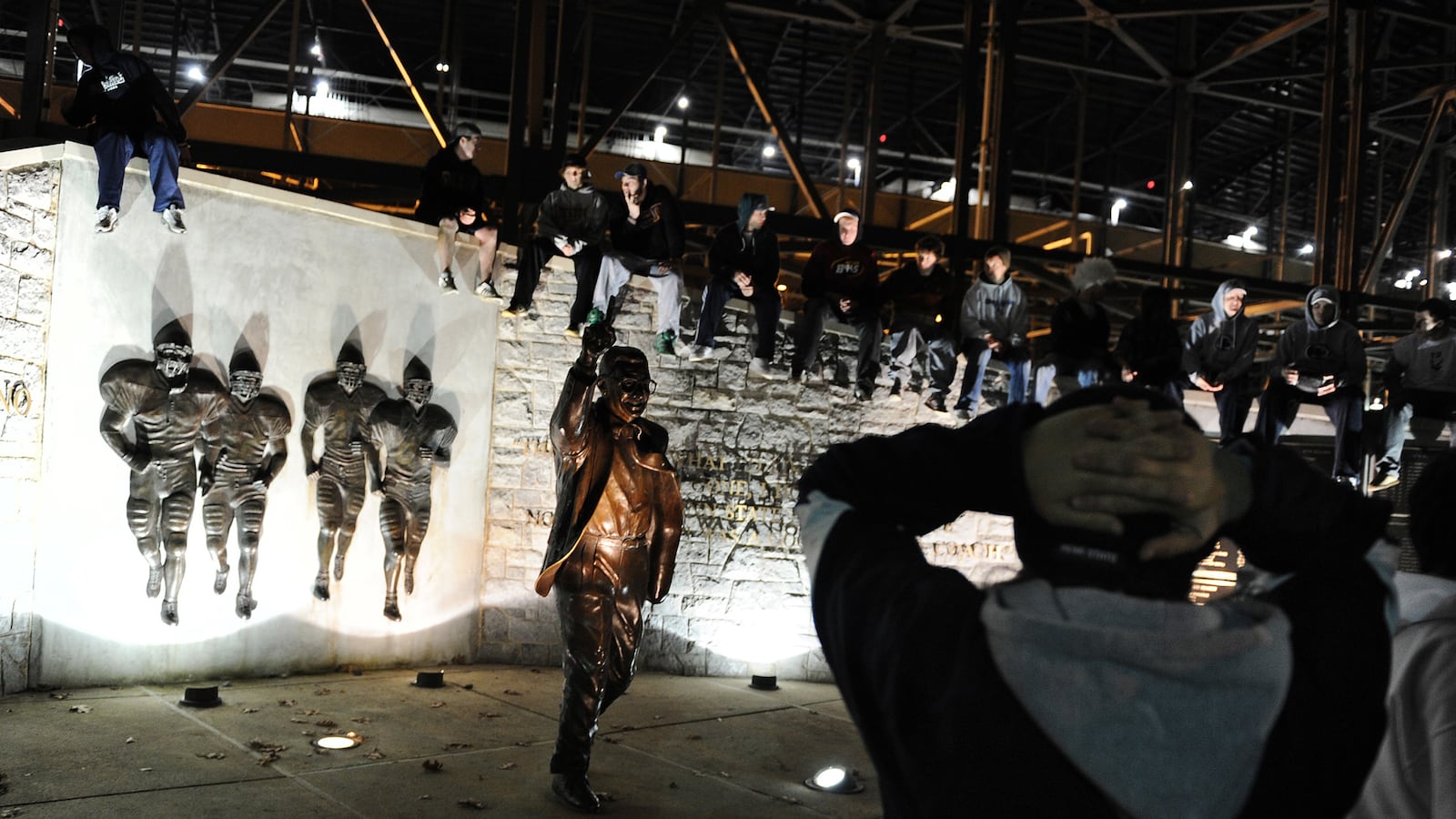I was in a foul and unforgiveable mood yesterday. I was late getting out of the house, cursing the vapors in an unhinged spew, forgetting to take the medication that keeps me tethered. I have been doing a radio gig for a while on WPHT-AM in Philadelphia; during a break I went off on my partner without rational reason or right, viciously attacking him verbally, wild-eyed in anger.
Part of it was lack of sleep. Part of it was the anxiety and stress that I can no longer control without those pharmaceutical props. But part of it was the detailed report by former FBI Director Louis Freeh on how the monster of former assistant coach Jerry Sandusky was not only allowed to exist but to bloom at Penn State University. On at least two occasions, 1998 and 2001, there were clear indications that Sandusky was sexually abusing kids. Nothing was done and Sandusky went on to rape other kids. But he still got his lump sum pension payment of $168,000, unprecedented in school history, according to the Freeh report. He still got emeritus status, although I naively thought that such status was reserved for professors, not a man in the trivial pursuit of coaching linebackers. He still got keys to all the buildings. He still made nearly 60 trips at university expense even after retiring in 1999. He still got special VIP season tickets. A week before his arrest, even though he knew he was under investigation by a grand jury, he still used them. The only thing missing was a special plaque commemorating Sandusky’s fine years of service to the school as a sexual animal.
Like many of you, I have lived with this horror ever the since the report of a state grand jury in Pennsylvania was made public in November of 2011, detailing act after act of buttf--king by Sandusky on defenseless children, much of it taking place in the Lasch building on the Penn State campus, in spitting distance to where the eternally damned Joe Paterno had his office.
From my own experience writing about the insidious culture of sports in America for nearly 25 years, I knew instantly that the culture of football at Penn State lay at the horror of what happened. I knew that powerful men at the university, Paterno in particular, drunk with the ego and false immortality that big-time college football coaches incomprehensibly have in this country, were covering up. I knew that Paterno and other top officials at the school, given the choice between feeling any scent of emotion for young children who had allegedly been molested by Sandusky or worrying about Jerry Sandusky’s welfare because he was a member of the Happy Valley football family and an integral part of Penn State football in its heyday in the late 1990s, had picked Sandusky in a second.
I knew Paterno and his acolytes, because he ran the school, would stretch and strain and lie to themselves and obfuscate to make their buddy boy Jerry the victim, a man at most with a sickness who needed help. I knew they had given good ol’ Jerry every benefit of the doubt as a way of covering up for his obvious predatory behavior despite the obvious warning signs, which was also a way of covering up for the football program at Penn State and keeping the football culture at the forefront of the university, the core of the bicycle wheel from which every other spoke extended. I knew this had happened because Joe Paterno, not a good man but a bad one far more adept than he ever was coaching at creating his false narrative of being above the sinkhole of college football, wanted it to happen this way.

When Louis Freeh held a press conference yesterday and stated point blank, after interviewing nearly 400 individuals and spending $6.5 million, that “four of the most powerful people at the Pennsylvania State University—President Graham Spanier, Senior Vice President for Finance and Business Gary C. Schultz, Athletic Director Timothy M. Curley, and Head Football Coach Joseph V. Paterno—failed to protect against a child sexual predator harming children for over a decade,” I felt like I imagine many of you felt who were outraged from the beginning: no vindication.
To the contrary, I felt overwhelming sadness and agitation that the Freeh report is the end of the Penn State investigation into the football culture that permeated every pore of the university, the board of trustees sighing with palpable relief that the self-flagellation they allowed the university to take by commissioning the report was enough.
I felt sick to my stomach as I watched the board of trustees’ press conference after the release of the Freeh report, or at least watched as much as I could. They cared more about their carefully coiffed look than they did about actually doing anything proactive. Their carefully scripted words, examined beforehand no doubt by a phalanx of spinmeisters, were barely above a monotone.
When I heard the words “accountability” and “responsibility,” the words entitled people use to act as if they will do something when they won’t, I sank, once again like many of you, into a funk of deflation and disappointment. Writing about Penn State football has never been about me. It has been about the fact that college football, as admittedly exciting as it is, serves no academic purpose and in the end, can destroy a school’s reputation.
The board should have announced yesterday that the upcoming season of football at Penn State will be cancelled. It would have been a sincere and needed message to the world that the football culture will no longer be sustained. For the innocent players caught up in this monstrosity, the answer is easy—release them from their scholarship commitments to Penn State and let them go elsewhere without the normal period of having to sit out a year. That way they would not be punished for the sins of others.
But the board did nothing except blather in empty ring-around-the-rosy rhetoric. They should have said at a minimum that the statue of Joe Paterno, now a symbol of a man without moral standard, a man with the iron-clad agenda of protecting his football game at all costs, even if a sexual animal satisfied his cravings right under his nose, should be removed.
But they didn’t do any of those things, actions that are not only appropriate but also urgently immediate. The scathing report by Louis Freeh should be a beginning, not an end, but the board believes it is an end: we have allowed ourselves to be beaten bloody, our version of Fifty Shades of Grey, and what is more important in America today than a dramatic mea culpa. It is all part of the narrative, corporate damage control 101. The board is meeting today and perhaps a miracle will happen. If the board does the right thing, it should be commended.
It’s also in the hands of the National Collegiate Athletic Association now. They have said they are doing an investigation, so maybe there is something positive in that. If Southern Methodist University got the so-called death penalty from the NCAA for a widespread scheme of paying off recruits, banned from football for a year and only allowed to return in a severely reduced capacity, then Penn State should get a minimum five-year ban. Draconian? Yes. Brutal? Yes. But punishment is brutal and supposed to act as a deterrent to other schools who have not been involved in something as heinous as what Penn State officials did.
But the track record of the NCAA is atrocious. As Taylor Branch of pointed out in his brilliant piece for The Atlantic, the NCAA is a cartel that is there to protect the interests of the member schools that support it, not there as a body to enforce the excesses of sports in America and keep them clean and in perspective. The NCAA is about money, billions of it raised through tournaments and bowl games; Penn State has the second-highest profits of any football team in the country next to the University of Texas, about $50 million dollars. Excuse my English, but does the NCAA want to f--k with that? Does the school want to f--k with that?
So the report by Louis Freeh yesterday does what scathing reports always do—creates a blip of excitement where so-called experts, including myself, go on national television and give their invigorated two cents. There is actually meaning in those appearances, because they do keep the pressure on Penn State. The hue and cry for the banning of football has never been stronger. It is a good thing.
But America lives in blips of attention—focusing for a week here and a week there before moving onto something else. It is the 24-hour news cycle, a hysterical avalanche of stories before it’s time again to feed the insatiable beast.
I personally can’t imagine the Penn State football team taking the field this season. I can’t imagine the players running out of the tunnel pumped up like psychopathic creatures, slapping each other on the helmet, the ritualistic bounce of shoulder pad against shoulder pad.
But they will, because this is America and this is football. We are the only society in the world that looks to universities and colleges for primary sources of sports entertainment. I pray that I am wrong, but I am convinced that the Nittany Lions will take that field. There will no doubt be a moment of prayer before the game for the Sandusky victims, as if that means anything, lessens what happened to them. Then it will be time for the home opener. The 110,000 strong of Beaver Stadium, who like their university haven’t learned anything, will roar and bellow and get drunk. And the Freeh report will fade into the midst, like most reports do.






